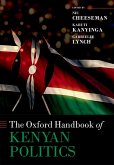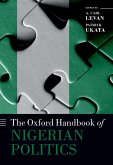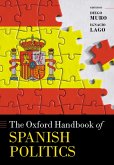The Oxford Handbook of Portuguese Politics (eBook, ePUB)
Redaktion: Fernandes, Jorge M.; Costa Pinto, António; Magalhães, Pedro C.


Alle Infos zum eBook verschenken

The Oxford Handbook of Portuguese Politics (eBook, ePUB)
Redaktion: Fernandes, Jorge M.; Costa Pinto, António; Magalhães, Pedro C.
- Format: ePub
- Merkliste
- Auf die Merkliste
- Bewerten Bewerten
- Teilen
- Produkt teilen
- Produkterinnerung
- Produkterinnerung

Hier können Sie sich einloggen

Bitte loggen Sie sich zunächst in Ihr Kundenkonto ein oder registrieren Sie sich bei bücher.de, um das eBook-Abo tolino select nutzen zu können.
The Oxford Handbook of Portuguese Politics brings together the best scholars in the field offering an unrivalled coverage of the politics (broadly defined) of the country over the past 50 years. The Handbook includes eight sections. First, it looks at the past and present by making an overview of Portuguese political developments since democratization in the 1970s. Second, it looks at political institutions as the building blocks of Portuguese democracy. The third section examines mass politics and voters, that is, a thorough analysis of the demand-side of mass politics. The fourth section…mehr
- Geräte: eReader
- mit Kopierschutz
- eBook Hilfe
- Größe: 11.79MB
![The Oxford Handbook of Japanese Politics (eBook, ePUB) The Oxford Handbook of Japanese Politics (eBook, ePUB)]() The Oxford Handbook of Japanese Politics (eBook, ePUB)90,95 €
The Oxford Handbook of Japanese Politics (eBook, ePUB)90,95 €![The Oxford Handbook of German Politics (eBook, ePUB) The Oxford Handbook of German Politics (eBook, ePUB)]() The Oxford Handbook of German Politics (eBook, ePUB)86,95 €
The Oxford Handbook of German Politics (eBook, ePUB)86,95 €![The Oxford Handbook of Scottish Politics (eBook, ePUB) The Oxford Handbook of Scottish Politics (eBook, ePUB)]() The Oxford Handbook of Scottish Politics (eBook, ePUB)86,95 €
The Oxford Handbook of Scottish Politics (eBook, ePUB)86,95 €![The Oxford Handbook of Kenyan Politics (eBook, ePUB) The Oxford Handbook of Kenyan Politics (eBook, ePUB)]() The Oxford Handbook of Kenyan Politics (eBook, ePUB)31,95 €
The Oxford Handbook of Kenyan Politics (eBook, ePUB)31,95 €![The Oxford Handbook of Nigerian Politics (eBook, ePUB) The Oxford Handbook of Nigerian Politics (eBook, ePUB)]() The Oxford Handbook of Nigerian Politics (eBook, ePUB)31,95 €
The Oxford Handbook of Nigerian Politics (eBook, ePUB)31,95 €![The Oxford Handbook of Spanish Politics (eBook, ePUB) The Oxford Handbook of Spanish Politics (eBook, ePUB)]() The Oxford Handbook of Spanish Politics (eBook, ePUB)86,95 €
The Oxford Handbook of Spanish Politics (eBook, ePUB)86,95 €![The Oxford Handbook of Political Executives (eBook, ePUB) The Oxford Handbook of Political Executives (eBook, ePUB)]() The Oxford Handbook of Political Executives (eBook, ePUB)86,95 €
The Oxford Handbook of Political Executives (eBook, ePUB)86,95 €-
-
-
Dieser Download kann aus rechtlichen Gründen nur mit Rechnungsadresse in A, B, BG, CY, CZ, D, DK, EW, E, FIN, F, GR, HR, H, IRL, I, LT, L, LR, M, NL, PL, P, R, S, SLO, SK ausgeliefert werden.
- Produktdetails
- Verlag: Oxford University Press
- Seitenzahl: 400
- Erscheinungstermin: 6. Oktober 2022
- Englisch
- ISBN-13: 9780192667731
- Artikelnr.: 66002108
- Verlag: Oxford University Press
- Seitenzahl: 400
- Erscheinungstermin: 6. Oktober 2022
- Englisch
- ISBN-13: 9780192667731
- Artikelnr.: 66002108
* 1: Robert M. Fishman: From Problematic Laggard to Star of the South?
The Comparative Significance of the Portuguese Case
* 2: António Costa Pinto and André Paris: Democratization and its
Legacies
* 3: Filipa Raimundo: Dealing with the Authoritarian Past
* 4: Luciano Amaral: Social, Economic, and Demographic Change during
the Portuguese Democracy (1974-2020)
* 5: Miguel Bandeira Jerónimo and José Pedro Monteiro: Empire and
Decolonization in Portuguese Africa
* 6: André Freire: The Centre-Left and the Radical Left in Portuguese
Democracy
* 7: Riccardo Marchi and André Azevedo Alves: The Right and Far-Right
in the Portuguese Democracy
* Political Institutions
* 8: Octavio Amorim Neto: Semi-Presidentialism in Portugal: Academic
Quarrels Amidst Institutional Stability
* 9: Eunice Goes and Cristina Leston-Bandeira: The Role of the
Portuguese Parliament
* 10: Pedro Silveira and Patrícia Silva: Executive Politics
* 11: Nuno Garoupa and Lydia Tiede: Judicial Politics in Portugal
* 12: Jorge M. Fernandes: Electoral System
* 13: António F. Tavares: Bureaucracy and Public Administration
* 14: Filipe Teles: Decentralization and Local Politics
* Mass Politics and Voters
* 15: José Sobral and Jorge Vala: Portuguese National Identity:
Historical Constructions and Contemporary Expressions
* 16: Pedro C. Magalhães: Citizens and Politics: Support and Engagement
* 17: José Santana-Pereira: Election Campaigns
* 18: Ignacio Lago: Voting Behaviour
* 19: João Cancela: Electoral Turnout
* 20: Susana Salgado: Mass Media and Political Communication
* Parties and Party System
* 21: Carlos Jalali and Edalina Rodrigues Sanches: Candidate Selection
in Portugal
* 22: Pedro Tavares de Almeida: Political Elites and Executive
Leadership
* 23: Fernando Bizzarro and Mafalda Pratas: Political Parties and Party
System
* 24: Ana Maria Belchior and Conceição Pequito: Parties and Political
Representation
* 25: Ingrid van Biezen and Fernando Casal Bértoa: Plus Ça Change?
Party Regulation in Portugal (1974-2020)
* Society
* 26: Ana Espírito-Santo and Ana Catalano Weeks: Gender and Politics in
Portugal
* 27: Marco Lisi and João Loureiro: Interest Groups, Business
Associations and Unions
* 28: João Carvalho: Emigration and Immigration in Portugal
* 29: Guya Accornero and Pedro Ramos Pinto: Movements at the Border.
Conflict and Protest in Portugal
* 30: Madalena Meyer Resende: The Relations Between the Catholic Church
and the Political Arena in Portugal
* 31: Carlos Farinha Rodrigues: Social and Economic Inequality
* Governance and Public Policies
* 32: Amílcar Moreira and Miguel Glatzer: The Portuguese Welfare State
* 33: Alexandre Afonso: Portuguese Labour Market Governance in
Comparative Perspective
* 34: Fernando Alexandre and Pedro Bação: The Portuguese Macroeconomic
Policy Framework
* 35: Ana Balcão Reis: Education Policies
* 36: Céu Mateus: Health Policies
* 37: Luís de Sousa and Susana Coroado: Political Corruption in
Portugal
* 38: Mariana Lopes da Fonseca: Taxation and Accountability at the
Local Level
* 39: João Amador: Portugal and the Challenges of Economic
Globalization
* Portugal and the European Union
* 40: Margarida Duarte: Portugal and the European Monetary Union
* 41: Laura Ferreira-Pereira: Portugal in the European Union:
Chronicling a Transformative Journey
* 42: Marina Costa Lobo: Politicising Europe: How It Affects Domestic
Political Competition in Portugal
* 43: Catherine Moury and Elisabetta De Giorgi: Bailout Politics in
Portugal (2008-2020)
* Foreign Policy and Defence
* 44: Maria Raquel Freire: Portuguese Foreign Policy
* 45: Andrés Malamud and Pedro Seabra: Portugal and Brazil
* 46: Ricardo Soares de Oliveira: Portugal and Africa
* 47: Bruno Oliveira Martins and Daniel Pinéu: Security and Geostrategy
* 48: Helena Carreiras: The Military and Defence Policies
* 1: Robert M. Fishman: From Problematic Laggard to Star of the South?
The Comparative Significance of the Portuguese Case
* 2: António Costa Pinto and André Paris: Democratization and its
Legacies
* 3: Filipa Raimundo: Dealing with the Authoritarian Past
* 4: Luciano Amaral: Social, Economic, and Demographic Change during
the Portuguese Democracy (1974-2020)
* 5: Miguel Bandeira Jerónimo and José Pedro Monteiro: Empire and
Decolonization in Portuguese Africa
* 6: André Freire: The Centre-Left and the Radical Left in Portuguese
Democracy
* 7: Riccardo Marchi and André Azevedo Alves: The Right and Far-Right
in the Portuguese Democracy
* Political Institutions
* 8: Octavio Amorim Neto: Semi-Presidentialism in Portugal: Academic
Quarrels Amidst Institutional Stability
* 9: Eunice Goes and Cristina Leston-Bandeira: The Role of the
Portuguese Parliament
* 10: Pedro Silveira and Patrícia Silva: Executive Politics
* 11: Nuno Garoupa and Lydia Tiede: Judicial Politics in Portugal
* 12: Jorge M. Fernandes: Electoral System
* 13: António F. Tavares: Bureaucracy and Public Administration
* 14: Filipe Teles: Decentralization and Local Politics
* Mass Politics and Voters
* 15: José Sobral and Jorge Vala: Portuguese National Identity:
Historical Constructions and Contemporary Expressions
* 16: Pedro C. Magalhães: Citizens and Politics: Support and Engagement
* 17: José Santana-Pereira: Election Campaigns
* 18: Ignacio Lago: Voting Behaviour
* 19: João Cancela: Electoral Turnout
* 20: Susana Salgado: Mass Media and Political Communication
* Parties and Party System
* 21: Carlos Jalali and Edalina Rodrigues Sanches: Candidate Selection
in Portugal
* 22: Pedro Tavares de Almeida: Political Elites and Executive
Leadership
* 23: Fernando Bizzarro and Mafalda Pratas: Political Parties and Party
System
* 24: Ana Maria Belchior and Conceição Pequito: Parties and Political
Representation
* 25: Ingrid van Biezen and Fernando Casal Bértoa: Plus Ça Change?
Party Regulation in Portugal (1974-2020)
* Society
* 26: Ana Espírito-Santo and Ana Catalano Weeks: Gender and Politics in
Portugal
* 27: Marco Lisi and João Loureiro: Interest Groups, Business
Associations and Unions
* 28: João Carvalho: Emigration and Immigration in Portugal
* 29: Guya Accornero and Pedro Ramos Pinto: Movements at the Border.
Conflict and Protest in Portugal
* 30: Madalena Meyer Resende: The Relations Between the Catholic Church
and the Political Arena in Portugal
* 31: Carlos Farinha Rodrigues: Social and Economic Inequality
* Governance and Public Policies
* 32: Amílcar Moreira and Miguel Glatzer: The Portuguese Welfare State
* 33: Alexandre Afonso: Portuguese Labour Market Governance in
Comparative Perspective
* 34: Fernando Alexandre and Pedro Bação: The Portuguese Macroeconomic
Policy Framework
* 35: Ana Balcão Reis: Education Policies
* 36: Céu Mateus: Health Policies
* 37: Luís de Sousa and Susana Coroado: Political Corruption in
Portugal
* 38: Mariana Lopes da Fonseca: Taxation and Accountability at the
Local Level
* 39: João Amador: Portugal and the Challenges of Economic
Globalization
* Portugal and the European Union
* 40: Margarida Duarte: Portugal and the European Monetary Union
* 41: Laura Ferreira-Pereira: Portugal in the European Union:
Chronicling a Transformative Journey
* 42: Marina Costa Lobo: Politicising Europe: How It Affects Domestic
Political Competition in Portugal
* 43: Catherine Moury and Elisabetta De Giorgi: Bailout Politics in
Portugal (2008-2020)
* Foreign Policy and Defence
* 44: Maria Raquel Freire: Portuguese Foreign Policy
* 45: Andrés Malamud and Pedro Seabra: Portugal and Brazil
* 46: Ricardo Soares de Oliveira: Portugal and Africa
* 47: Bruno Oliveira Martins and Daniel Pinéu: Security and Geostrategy
* 48: Helena Carreiras: The Military and Defence Policies







